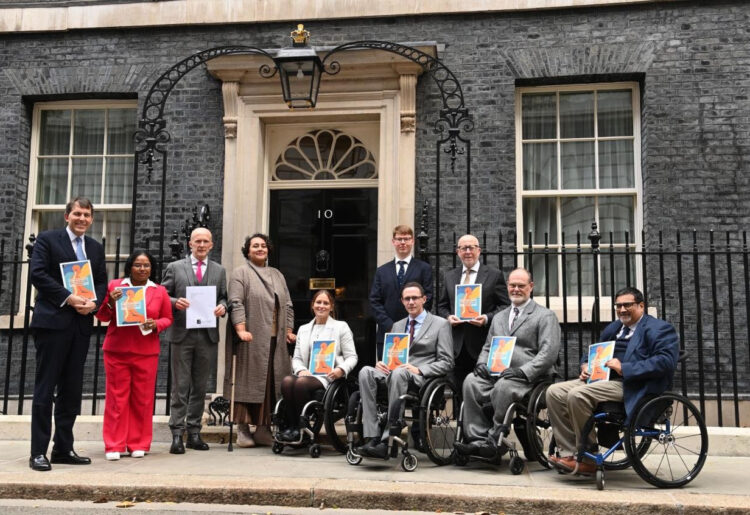Dani Watts from Reading, who sustained a spinal cord injury after an illegal rugby tackle, joined Spinal Injuries Association has delivered a petition to 10 Downing Street calling on the prime minister to end the postcode lottery in spinal cord injury care.
A new report from the All-Party Parliamentary Group (APPG) reveals that thousands of people who sustain spinal cord injuries in the UK face a system where recovery depends on chance, not national standards—leading to devastating physical and mental health consequences.
Every two hours in the UK, someone’s life changes forever due to spinal cord injury. These injuries often result in lifelong paralysis, chronic pain, and loss of bladder, bowel, and sexual function.
Dani is just one of those people, and she now lives with constant nerve pain that she describes as intense burning, as well as paralysis from the waist down.
She joined the Spinal Injuries Association to deliver the petition to advocate for others like her, and to ensure consistent care for people with spinal cord injuries throughout the country.
According to the charity, only 1 in 5 patients receives specialist rehabilitation at a spinal centre, leaving the majority without adequate support.
Many cannot return home due to inaccessible housing, lack of specialist expertise in their community, and a complete absence of mental health provision — 65% report serious mental health struggles.
The APPG report, backed by consultants, healthcare professionals across almost every NHS Trust, seven of the eight Spinal Cord Injury Centres, the Royal College of Nursing, partner charities, and Parliamentarians from both Houses, calls for urgent national standards to replace the current fragmented system.
Andy McDonald MP, chair of the APPG for Spinal Cord Injury, said: “I’ve heard from clinicians, researchers, charities, and — most importantly — people living with SCI.
“Their message is clear: the system is failing them. What should be a pathway of recovery has become a maze of delay, fragmentation, and inequality.
“This is not just a healthcare issue. It is a question of dignity, equality, and national leadership.”
Dani, who was forced to terminate a wanted pregnancy after complications arising from her spinal cord injury were not treated by medical staff, said: “I was denied two crucial MRI scans because they lacked an MRI-compatible chair and refused to use lift options reserved for emergencies.
“And if I had different treatment options available, I know my family would look different as, in 2023, we had to have a medical termination of our last baby when I was told it was a simple procedure to fix the issue.
“These experiences underscore the urgent need for improved accessibility and specialised care within the healthcare system to ensure that disabled women receive equitable and effective treatment.”
Spinal Injuries Association warned this is not just about improving outcomes for SCI patients — it sets a precedent for how the UK treats long-term neurological and complex conditions such as stroke, brain injury, MS, and MND, all of which suffer from similar fragmentation.
“These failures reflect a reluctance to invest in long-term, preventative care,” said a spokesperson for the charity.
“Yet the moral and economic case for reform is overwhelming: coordinated SCI care reduces hospital readmissions, lowers lifetime public sector costs, and allows people to live independent, fulfilled lives.”
Dani added: “Having shared knowledge from across the board within healthcare settings starts with the right people hearing the lived experiences and how they have had to battle a system that’s just not up-to-date with delivering the same healthcare I could access and receive before I was a disabled woman.”
























